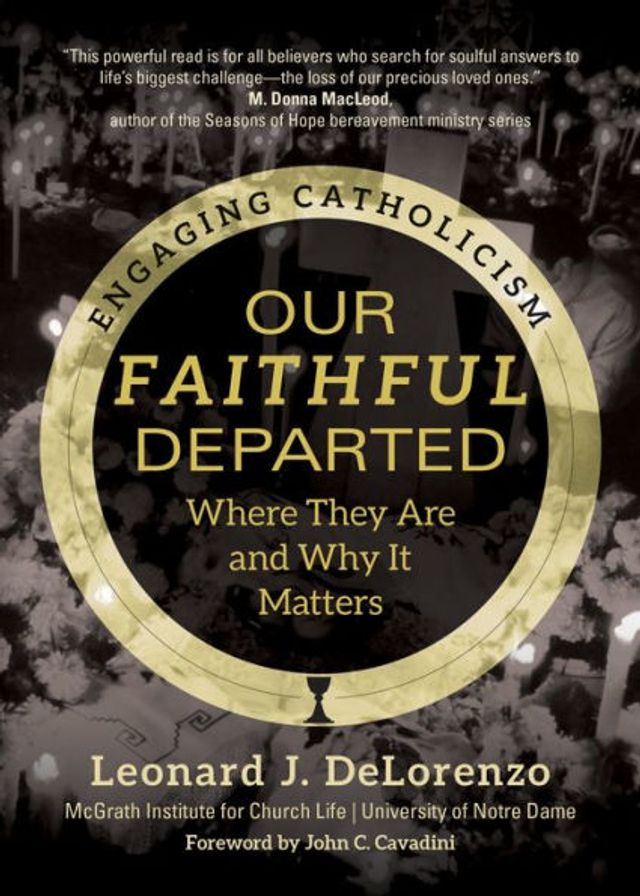Home
Our Faithful Departed: Where They Are and Why It Matters
Loading Inventory...
Barnes and Noble
Our Faithful Departed: Where They Are and Why It Matters
Current price: $12.99


Barnes and Noble
Our Faithful Departed: Where They Are and Why It Matters
Current price: $12.99
Loading Inventory...
Size: Audiobook
*Product Information may vary - to confirm product availability, pricing, and additional information please contact Barnes and Noble
Awarded third place in theology by the Association of Catholic Publishers and third place in grief and bereavement by the Catholic Media Association.
When someone we love dies, it’s difficult to look beyond our grief to understand that they are still with us.
And yet we hear in the funeral liturgy that “life is changed not ended.” In
Our Faithful Departed
, University of Notre Dame theologian Leonard J. DeLorenzo shows us what this means and how we are called to remain faithful in our relationships with the dead.
“Those whom we have known and loved in this life we have only known and loved partially, imperfectly,” DeLorenzo writes. “In heaven, what has been partial shall be made complete, and what has been imperfect shall be perfected.”
He explains that the Catholic Church teaches that heaven is not so much a place as it is a perfect communion in Christ where the living and the dead are forever united.
In this book, you will learn that:
St. Teresa of Calcutta thought of her own life as a practice for heaven;
the Eucharist is a prayer for the dead, an offering brought to the altar;
Día de los Muertos
is an understanding that death is not the opposite of life, but part of it;
Christ wants us to broaden and deepen our notions of the body;
we can practice communion with the dead by praying for them, remembering them by name during the Mass, sharing memories of them, and celebrating them in devotional practices.
DeLorenzo relates his own story of the loss of his grandparents and shares heartwarming experiences from other Catholics—including Laura Kelly Fanucci, Stephanie DePrez, and John Cavadini—who have felt the connection with their lost friends and loved ones.
DeLorenzo said that the Church must encourage communion with the dead through public acts such as Eucharistic processions, prayer, monthly adoration with prayers for the souls in purgatory, and by accompanying the grieving with tenderness and compassion.
When someone we love dies, it’s difficult to look beyond our grief to understand that they are still with us.
And yet we hear in the funeral liturgy that “life is changed not ended.” In
Our Faithful Departed
, University of Notre Dame theologian Leonard J. DeLorenzo shows us what this means and how we are called to remain faithful in our relationships with the dead.
“Those whom we have known and loved in this life we have only known and loved partially, imperfectly,” DeLorenzo writes. “In heaven, what has been partial shall be made complete, and what has been imperfect shall be perfected.”
He explains that the Catholic Church teaches that heaven is not so much a place as it is a perfect communion in Christ where the living and the dead are forever united.
In this book, you will learn that:
St. Teresa of Calcutta thought of her own life as a practice for heaven;
the Eucharist is a prayer for the dead, an offering brought to the altar;
Día de los Muertos
is an understanding that death is not the opposite of life, but part of it;
Christ wants us to broaden and deepen our notions of the body;
we can practice communion with the dead by praying for them, remembering them by name during the Mass, sharing memories of them, and celebrating them in devotional practices.
DeLorenzo relates his own story of the loss of his grandparents and shares heartwarming experiences from other Catholics—including Laura Kelly Fanucci, Stephanie DePrez, and John Cavadini—who have felt the connection with their lost friends and loved ones.
DeLorenzo said that the Church must encourage communion with the dead through public acts such as Eucharistic processions, prayer, monthly adoration with prayers for the souls in purgatory, and by accompanying the grieving with tenderness and compassion.

![To the Faithful Departed [Deluxe Edition]](https://prodimage.images-bn.com/pimages/0602455709479_p0_v1_s600x595.jpg)
















